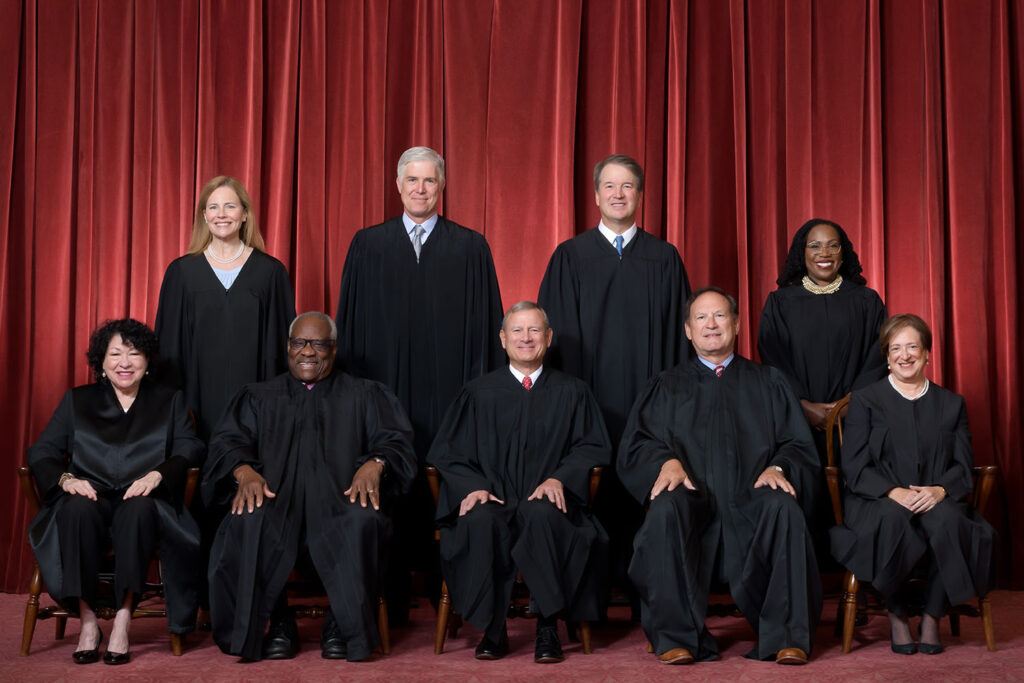
Standing from left are Justices Amy Coney Barrett, Neil M. Gorsuch, Brett M. Kavanaugh, and Ketanji Brown Jackson. (Credit: Fred Schilling, Collection of the Supreme Court of the United States)
By Dave Workman
Editor-in-Chief
In a unanimous ruling Thursday, the U.S. Supreme Court decided in favor of the National Rifle Association in a First Amendment case against a former New York State official who allegedly pressured financial institutions to stop doing business with the 153-year-old gun rights organization.
Writing for the court, Associate Justice Sonia Sotomayor stated, “Government officials cannot attempt to coerce private parties in order to punish or suppress views that the government disfavors.”
The ruling revives NRA’s lawsuit against former New York State Department of Financial Services (DFS) chief Maria Vullo. The high court vacated a decision by the 2nd U.S. Circuit Court of Appeals which sided with Vullo, and remanded the case for further proceedings.
The Hill is reporting that Vullo “began investigating the NRA in 2017” which “led her to encourage insurers and banks she regulated to sever ties with the gun rights group after the Parkland, Fla., school shooting” in 2018.
“Vullo was free to criticize the NRA and pursue the conceded violations of New York insurance law,”
Justice Sotomayor observed. “She could not wield her power, however, to threaten enforcement actions against DFS-regulated entities in order to punish or suppress the NRA’s gun-promotion advocacy. Because the complaint plausibly alleges that Vullo did just that, the Court holds that the NRA stated a First Amendment violation.”
It is a significant victory for the NRA, which has been under withering legal attack by New York Attorney General Letitia James over financial mismanagement. NRA is incorporated in New York State, allowing James to investigate allegations against the group.
The irony here is that this is a First Amendment victory which could ultimately help NRA’s efforts to defend the Second Amendment. NRA has undergone considerable change in recent months, beginning with the departure of longtime CEO Wayne LaPierre, and the elections of new “reform” officers to top positions on the Board of Directors. LaPierre has been succeeded by Doug Hamlin who had been serving as NRA’s executive director of Publications.
The new NRA president is former Georgia Congressman Bob Barr, while newly-elected “reform” board member William A. Bachenberg is first vice president, and Mark E. Vaughan, another “reform” candidate, was elected second vice president by the board.
Writing carefully because the lawsuit must still be adjudicated by the lower court, Sotomayor explained, “The NRA’s allegations, if true, highlight the constitutional concerns with the kind of intermediary strategy that Vullo purportedly adopted to target the NRA’s advocacy. Such a strategy allows government officials to ‘expand their regulatory jurisdiction to suppress the speech of organizations that they have no direct control over.’…It also allows government officials to be more effective in their speech-suppression efforts ‘[b]ecause intermediaries will often be less invested in the speaker’s message and thus less likely to risk the regulator’s ire.’ The allegations here bear this out. Although ‘the NRA was not even the directly regulated party,’ Vullo allegedly used the power of her office to target gun promotion by going after the NRA’s business partners. Insurers in turn followed Vullo’s lead, fearing regulatory hostility.
“Ultimately, the critical takeaway is that the First Amendment prohibits government officials from wielding their power selectively to punish or suppress speech, directly or (as alleged here) through private intermediaries,” Sotomayor wrote a few lines later.



